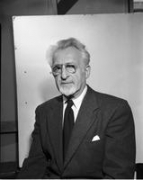Awards
- National Academies - 1925
- American Association for the Advancement of Science

Jacob Robert Kantor was born in Harrisburg, Pennsylvania on August 8, 1888. He entered the University of Chicago in 1910, earning a Ph.B. in 1914 and a Ph.D. in psychology in 1917. Kantor began his teaching career as an instructor at the University of Minnesota, remained there from 1915 to 1917, and continued as an instructor at the University of Chicago from 1917 to 1920. When Kantor came to Indiana University in 1920, he joined a small but established Department of Psychology and Philosophy with a strong tradition of empirical investigation. At IU, Kantor began his long career as a psychological theorist and system-builder. The dominant motif in his varied work was a passionate belief in the possibility of a truly objective science of behavior. To this end he developed a comprehensive analytical framework, termed interbehaviorism, first published in his two-volume Principles of Psychology (1924-26). His 20 books and more than 120 scholarly articles centered on the psychology of learning, encompassed most of the major subfields of psychology, including sensory, abnormal, physiological, and social psychology. A representative collection of his papers is gathered in The Aim and Progress of Psychology and Other Sciences (1971). Kantor also devoted major efforts to logic and to linguistics. In Psychology and Logic (1945-50) and in The Logic of Modern Science (1953) he sought to develop a thoroughly naturalistic, nonmathematical conception of logic that was based on actual human behavior rather than on ideal or formal prescriptions. Likewise, linguistics was analyzed as a complex interaction between the performer of linguistic actions and the controlling environment in An Objective Psychology of Grammar (1936) and Psychological Linguistics (1977). He was the first to use the term psycholinguistics. In a related vein, his massive and erudite Scientific Evolution of Psychology (1963-69) was aimed toward salvaging useful materials for the reform of modern psychology rather than toward the goal of understanding past ideas in their context. In his 90s, he published Interbehavioral Philosophy (1931), Cultural Psychology (1982), and Tragedy and the Event Continuum (1983). He was also a frequent editorial contributor to The Psychological Record, a journal he established in 1937. He was an elected fellow of the American Association for the Advancement of Science and he received an honorary doctorate from the University of Akron in 1971. He made his last visit to the Bloomington Campus in 1978, when he gave a colloquium in the Psychology Department. Kantor passed away February 2, 1984.